Those Who Lean a Little Left


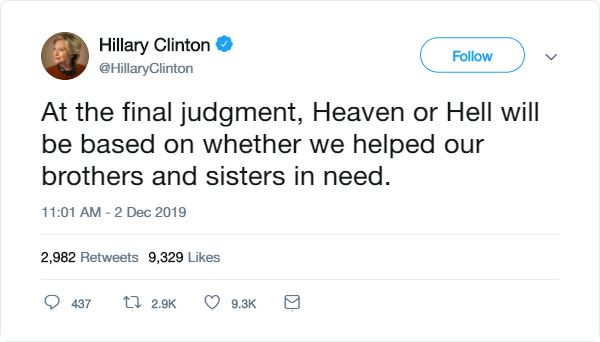
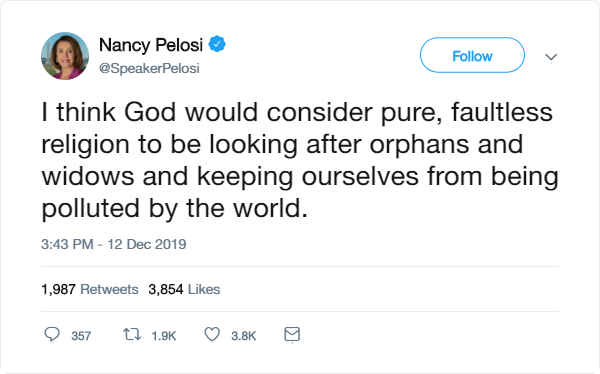
These tweets aren’t real. They were created with a tweet generator. But it’s easy to imagine them really happening. Elizabeth Warren has been quoting Matthew 25 for years, so why wouldn’t others use Scripture to support their positions too?
Ezekiel 16:49 – Now this was the iniquity of your sister Sodom: She and her daughters had pride, plenty of food, and comfortable security, but didn’t support the poor and needy.
Matthew 25:31-46 – “When the Son of Man comes in his glory, and all the angels with him, then he will sit on his glorious throne. All the nations will be gathered before him, and he will separate them one from another, just as a shepherd separates the sheep from the goats. He will put the sheep on his right and the goats on the left.
“Then the King will say to those on his right, ‘Come, you who are blessed by my Father; inherit the kingdom prepared for you from the foundation of the world.
“‘For I was hungry and you gave me something to eat; I was thirsty and you gave me something to drink; I was a stranger and you took me in; I was naked and you clothed me; I was sick and you took care of me; I was in prison and you visited me.’
“Then the righteous will answer him, ‘Lord, when did we see you hungry and feed you, or thirsty and give you something to drink? When did we see you a stranger and take you in, or without clothes and clothe you? When did we see you sick, or in prison, and visit you?’
“And the King will answer them, ‘Truly I tell you, whatever you did for one of the least of these brothers and sisters of mine, you did for me.’”
James 1:27 – Pure and undefiled religion before God the Father is this: to look after orphans and widows in their distress and to keep oneself unstained from the world.
Appropriate reactions would point out that context is important — that, for instance, when Jesus says “For …”, he’s not saying that our eternal destiny is because of our works. We know clearly from the rest of Scripture (e.g. Ephesians 2:8-9) that our eternal life is by grace alone through faith alone in Christ alone, and that while our salvation is evidenced by our works (as in this passage and in James 2:14-20), it is not our works that save us.
Still, a strong Liberal bent runs through these passages even when context is considered.
In a tweet on December 20, our president called Christianity Today a “far left magazine”. “Far left” is a stretch, but there are definitely a few ways in which following Scripture’s teachings place someone more on the Left side of the aisle than the Right today. Here are some other Scripture passages that read like Liberal talking points:
Psalm 112:1,9 – Hallelujah! Happy is the person who fears the Lord, taking great delight in his commands. … He distributes freely to the poor; his righteousness endures forever. His horn will be exalted in honor.
Proverbs 14:21,31 – The one who despises his neighbor sins, but whoever shows kindness to the poor will be happy. … The one who oppresses the poor person insults his Maker, but one who is kind to the needy honors him.
Proverbs 19:17 – Kindness to the poor is a loan to the Lord, and he will give a reward to the lender.
Proverbs 21:13 – The one who shuts his ears to the cry of the poor will himself also call out and not be answered.
Proverbs 22:9 – A generous person will be blessed, for he shares his food with the poor.
Proverbs 28:27 – The one who gives to the poor will not be in need, but one who turns his eyes away will receive many curses.
Proverbs 31:8-9 – Speak up for those who have no voice, for the justice of all who are dispossessed. Speak up, judge righteously, and defend the cause of the oppressed and needy.
Isaiah 58:6-11 – “Isn’t this the fast I choose: To break the chains of wickedness, to untie the ropes of the yoke, to set the oppressed free, and to tear off every yoke? Is it not to share your bread with the hungry, to bring the poor and homeless into your house, to clothe the naked when you see him, and not to ignore your own flesh and blood? Then your light will appear like the dawn, and your recovery will come quickly. Your righteousness will go before you, and the Lord’s glory will be your rear guard.
“At that time, when you call, the Lord will answer; when you cry out, he will say, ‘Here I am.’ If you get rid of the yoke among you, the finger-pointing and malicious speaking, and if you offer yourself to the hungry, and satisfy the afflicted one, then your light will shine in the darkness, and your night will be like noonday.”
Jeremiah 22:16 – “He defended the cause of the poor and needy, and so all went well. Is that not what it means to know me?” declares the Lord.
Matthew 5:42 – Give to the one who asks you, and don’t turn away from the one who wants to borrow from you.
Luke 3:8-11 – “Produce fruit consistent with repentance. And don’t start saying to yourselves, ‘We have Abraham as our father,’ for I tell you that God is able to raise up children for Abraham from these stones. The ax is already at the root of the trees. Therefore, every tree that doesn’t produce good fruit will be cut down and thrown into the fire.”
“What then should we do?” the crowds were asking him.
He replied to them, “The one who has two shirts must share with someone who has none, and the one who has food must do the same.”
Luke 12:33 – Sell your possessions and give to the poor. Make money-bags for yourselves that won’t grow old, an inexhaustible treasure in heaven, where no thief comes near and no moth destroys.
Luke 16:19-25 – “There was a rich man who would dress in purple and fine linen, feasting lavishly every day. But a poor man named Lazarus, covered with sores, was lying at his gate. He longed to be filled with what fell from the rich man’s table, but instead the dogs would come and lick his sores. One day the poor man died and was carried away by the angels to Abraham’s side. The rich man also died and was buried. And being in torment in Hades, he looked up and saw Abraham a long way off, with Lazarus at his side. ‘Father Abraham!’ he called out, ‘Have mercy on me and send Lazarus to dip the tip of his finger in water and cool my tongue, because I am in agony in this flame!’
“‘Son,’ Abraham said, ‘remember that during your life you received your good things, just as Lazarus received bad things, but now he is comforted here, while you are in agony.’”
Acts 2:44-45 – Now all the believers were together and held all things in common. They sold their possessions and property and distributed the proceeds to all, as any had need.
Acts 4:32 – Now the entire group of those who believed were of one heart and mind, and no one claimed that any of his possessions was his own, but instead they held everything in common.
2 Corinthians 8:13-15 – It is not that there should be relief for others and hardship for you, but it is a question of equality. At the present time your surplus is available for their need, so that their abundance may in turn meet your need, in order that there may be equality. As it is written: “The person who had much did not have too much, and the person who had little did not have too little.”
Ephesians 4:28 – Let the thief no longer steal. Instead, he is to do honest work with his own hands, so that he has something to share with anyone in need.
1 Timothy 6:17-19 – Instruct those who are rich in the present age not to be arrogant or to set their hope on the uncertainty of wealth, but on God, who richly provides us with all things to enjoy. Instruct them to do what is good, to be rich in good works, to be generous and willing to share, storing up treasure for themselves as a good foundation for the coming age, so that they may take hold of what is truly life.
Hebrews 13:16 – Don’t neglect to do what is good and to share, for God is pleased with such sacrifices.
James 2:15-16 – If a brother or sister is without clothes and lacks daily food and one of you says to them, “Go in peace, stay warm, and be well fed,” but you don’t give them what the body needs, what good is it?
1 John 3:16-18 – This is how we have come to know love: He laid down his life for us. We should also lay down our lives for our brothers and sisters. If anyone has this world’s goods and sees a fellow believer in need but withholds compassion from him—how does God’s love reside in him? Little children, let us not love in word or speech, but in action and in truth.
Galatians 6:9-10 – Let us not get tired of doing good, for we will reap at the proper time if we don’t give up. Therefore, as we have opportunity, let us work for the good of all, especially for those who belong to the household of faith.
It is the tendency of many today to require complete adherence to one party platform or another. Any seeming agreement with “the enemy” is seen as a total defection to the other side. But in 2020, there is no major American political party that perfectly encapsulates Christianity. Southern Baptist Pastor Bart Barber phrased it well:
I’m an ultra-conservative. I’m a hard-right-winger.
By that, I mean this: I’m a thoroughgoing biblical inerrantist. When I say that I’m an ultra-conservative, I’m describing my THEOLOGY, not my POLITICS.
Now, I’m also, as things presently lie in American politics, generally speaking, a conservative. But I’m not committed to that at all; my commitment lies with conservative theology.
It’s an important distinction, because the Bible never changes, but what it means to be a political conservative changes all the time. Under Ronald Reagan, it meant one thing. Under Donald Trump, it seems to mean something else. Who knows what it will mean in 10 years?
There’s no axiomatic trouble with BEING both a biblical and a political conservative, but you can’t be COMMITTED to both. When they diverge, you’re going to have to choose which way you’re going to go. I’m sticking with the word of God, as best as I can understand it.
The AND Campaign is doing an admirable job of advocating for a Biblical middle ground between Left and Right — a daunting task in today’s emotionally charged atmosphere. Their 2020 Statement does a great job of defining what, exactly, a Biblical worldview looks like in U.S. politics today.
Where it fails, for me, is in placing the blame for our current problems solely on the current administration. While Washington is in its worst shape in decades, we didn’t get here overnight and both parties contributed heavily. Republicans and Democrats should share the blame equally.
Other than that, I think the substance of the Statement is outstanding and I would endorse a rewriting like this that does not place blame on a single party:
Race and Voter Rights
America was built by enslaved people and immigrant workers who brought the country closer to its founding ideals through their sacrifices and protests. And yet racial discrimination has pervaded American public policy and the law since our nation’s inception, and its effects continue today. People of color still haven’t fully recovered from the War on Drugs and a myriad of other government sanctioned efforts that devastated communities and weakened families. We must address racial disparities in education, poverty-levels, healthcare, environmental quality, and the criminal justice system head on. Central to that effort must be the vigilant protection of voting rights. Voting should be fair, accessible, and convenient for all eligible American citizens, and enfranchisement should extend to former felons who have paid their debt to society.
The Poor and Pro-Family Policies
America can’t disregard poor people in policymaking. We need creative anti-poverty policies that work in tandem with, not in opposition to, other institutions, including the family and the church. We believe in the dignity of work, and that workers should receive a livable wage. Education should be accessible and equitable for all children. Paid family leave and enhanced child tax credits are both family-oriented policies that relieve the burden on hard working parents and create opportunities for them to invest more time and resources into their children and loved ones. In order for families—and indeed, the nation—to thrive, women must be free from discrimination, harassment and abuse.
Religious Freedom and LGBTQ Rights
All attempts to remove more traditional religious beliefs from the public square should be opposed. We, like many other Americans, affirm the historic Christian sexual ethic, and we also believe that religious freedom and LGBTQ civil rights are not necessarily in irreconcilable conflict. Faith-based charities, hospitals and colleges should not have to choose between surrendering their convictions and closing their doors. At the same time, LGBTQ people should not lose jobs and housing because of how they identify. We must pursue ways to disagree and live together without bullying or compromising our conscience.
Immigration
Increasingly, administrations have failed to treat undocumented immigrants with dignity and care, especially at the U.S.-Mexico border. In light of God’s special concern for the immigrant and the sojourner, we are deeply dissatisfied with the federal government’s continued negligence when it comes to passing comprehensive immigration reform. Draconian, manipulative measures to stoke fear in immigrant communities and pit family members against one another is reprehensible. Our government must always seek to be both just and compassionate regarding immigration policy, especially in protecting Dreamers and upholding longstanding laws regarding refugees fleeing violence, lawlessness and oppression.
Healthcare and Abortion
We believe in building a society that respects human dignity at all stages of life, including the unborn. This includes accessible and affordable health care for everyone. Americans should not go bankrupt because they get sick or die because their medication is exorbitantly expensive. This includes policies that support maternal health and address our nation’s high rate of maternal mortality, especially among Black and Native American women. It includes vigilant prosecution of pregnancy discrimination in education and the workplace. It is essential that the sanctity of human life at every stage, in particular in the womb, is defended vigorously. Abortion is a tragedy, not a social good, that should be vehemently discouraged rather than promoted.
While each of us would probably have our own version of this platform, the more we can achieve this piece, the better off we’ll all be: We must pursue ways to disagree and live together without bullying or compromising our conscience.
Featured Photo: © Mstyslav Chernov / Wikimedia Commons / CC-BY-SA-3.0






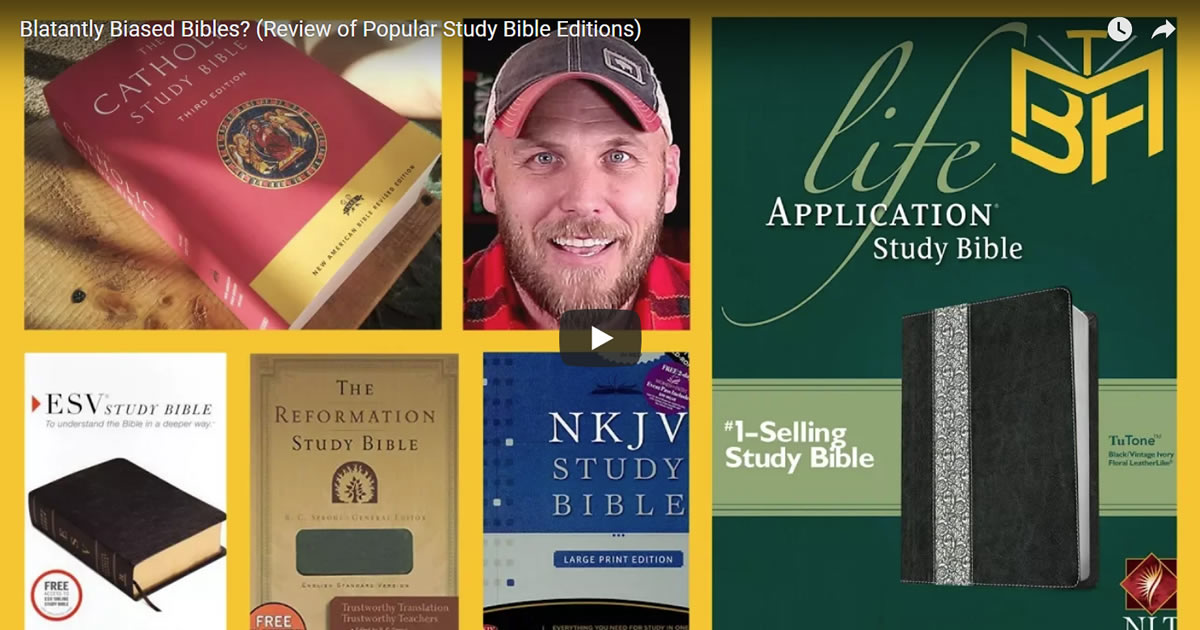

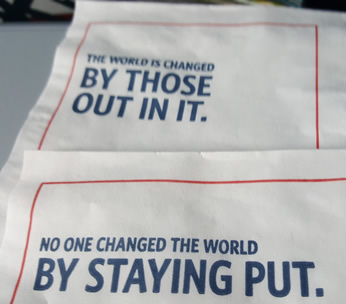 God speaks to people in different ways. For me, God almost always gives me little or not so little signs when I pray for them. I believe it is because knows he my insecurities and realizes I need the affirmation of a sign. Well, God gave me one sign after another on this trip that he was indeed in control and that he was a loving God that cared for my son. The first of those signs came on the plane when the polite stewardess placed our beverage napkins onto our tray tables. My napkin said, “The world is changed by those out in it.” Jonathan’s napkin said, “No one changed the world by staying put.” Ok, Lord, I hear you, but my mama heart is not convinced. I am going to need a little more.
God speaks to people in different ways. For me, God almost always gives me little or not so little signs when I pray for them. I believe it is because knows he my insecurities and realizes I need the affirmation of a sign. Well, God gave me one sign after another on this trip that he was indeed in control and that he was a loving God that cared for my son. The first of those signs came on the plane when the polite stewardess placed our beverage napkins onto our tray tables. My napkin said, “The world is changed by those out in it.” Jonathan’s napkin said, “No one changed the world by staying put.” Ok, Lord, I hear you, but my mama heart is not convinced. I am going to need a little more.
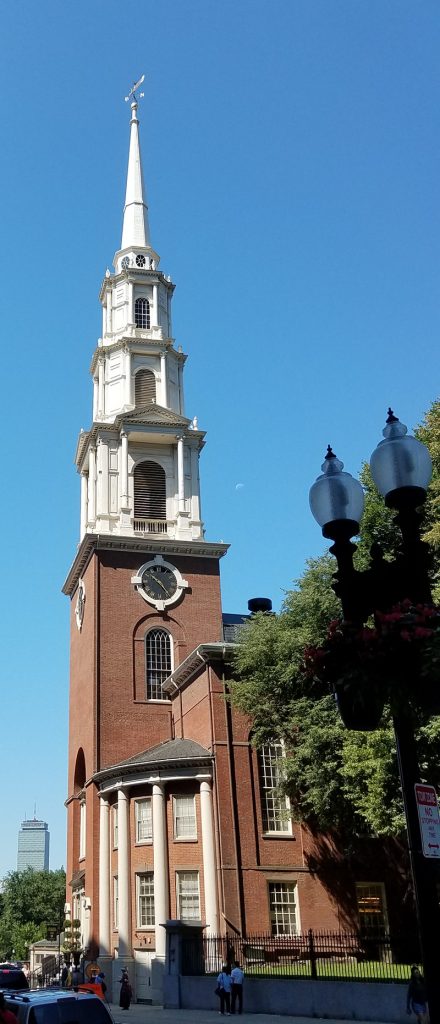 We got into Boston Wednesday afternoon and saw a ton of sights before bed that night. And Thursday and Friday we saw so many more that I began to wonder whether we had planned too long a trip. What were we going to do with two more whole days Saturday and Sunday? More than once I pondered changing our flight home from Sunday night to Saturday. (Hotels in Boston are not cheap; leaving a day early would make a huge difference.) God wouldn’t let me, though, and Friday night I found out why.
We got into Boston Wednesday afternoon and saw a ton of sights before bed that night. And Thursday and Friday we saw so many more that I began to wonder whether we had planned too long a trip. What were we going to do with two more whole days Saturday and Sunday? More than once I pondered changing our flight home from Sunday night to Saturday. (Hotels in Boston are not cheap; leaving a day early would make a huge difference.) God wouldn’t let me, though, and Friday night I found out why. But this past spring, as I sat in church after Easter yet still meditating on those days of old, a thought entered my mind: It’s over now. Jesus had been reunited with the Father. The disciples were on their own. The Bible gives us an account of what the disciples were thinking and doing after Jesus ascended into heaven, but what was the Lord thinking? Was he watching over them, wondering, “Was it enough? Did they get it? Did I teach them everything they needed to know to do this on their own?” As these thoughts continued to run through my mind, I couldn’t help but make the connection to the thoughts we often feel as parents embarking on the next phase of our child’s life. “Did I teach him enough? Did we spend enough time together? Was she listening?”
But this past spring, as I sat in church after Easter yet still meditating on those days of old, a thought entered my mind: It’s over now. Jesus had been reunited with the Father. The disciples were on their own. The Bible gives us an account of what the disciples were thinking and doing after Jesus ascended into heaven, but what was the Lord thinking? Was he watching over them, wondering, “Was it enough? Did they get it? Did I teach them everything they needed to know to do this on their own?” As these thoughts continued to run through my mind, I couldn’t help but make the connection to the thoughts we often feel as parents embarking on the next phase of our child’s life. “Did I teach him enough? Did we spend enough time together? Was she listening?”
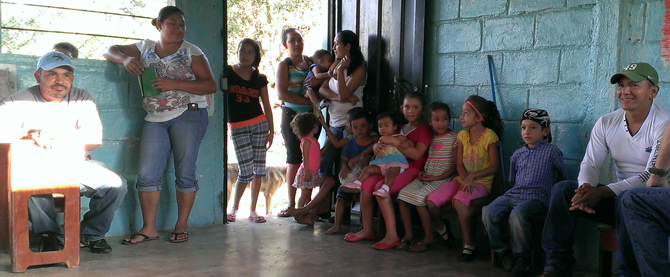
 God has made the people of Honduras and Nicaragua my neighbors. My responsibility is to love them just as I love myself. In this particular situation, at this particular time, that means working with them and for them to develop economic opportunities.
God has made the people of Honduras and Nicaragua my neighbors. My responsibility is to love them just as I love myself. In this particular situation, at this particular time, that means working with them and for them to develop economic opportunities.